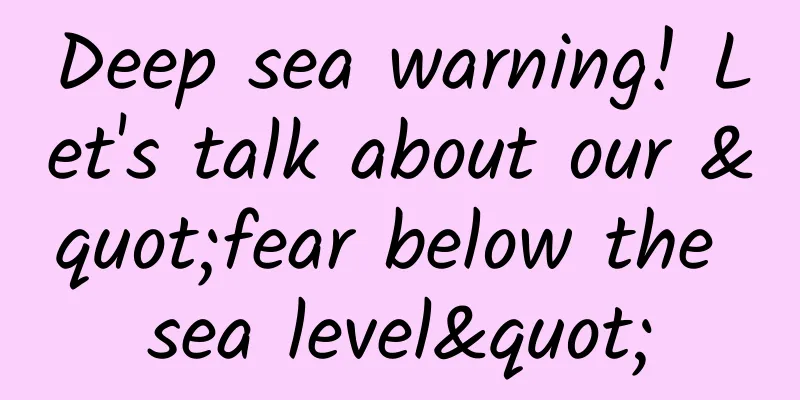Deep sea warning! Let's talk about our "fear below the sea level"

|
The blue ocean makes people feel relaxed and happy, and we always call the creatures in it the elves of the sea. Such a place that seems full of life has become the nightmare of many people and the object of their greatest fear in real life. Is our fear of the ocean just because we simply can't swim or are afraid of water? What is under this calm sea surface that makes us hesitate? Today we will talk about the secrets behind people's fear of the ocean. What exactly is this fear? The fear of the ocean has its own term, called thalassophobia. It refers to the strong and extreme fear people have of large and/or deep bodies of water, or even related pictures and images. It may cause physical reactions such as trembling, palpitations, breathing problems, dizziness, nausea, and psychological and emotional reactions such as panic, anxiety, loss of control, and a sense of impending death. Although there is no detailed statistical data on the prevalence of thalassophobia among the population, researchers have inferred that about 3%-4% of the world's total population has an extreme fear of the ocean. Where does the “fear below sea level” come from? After a long period of speculation and research on thalassophobia, the reasons why we may have fear have gradually surfaced, including the following two inferences. 1. Survival needs Scientists believe that the fear of large bodies of water, such as lakes, rivers, and oceans, is a manifestation of the evolutionary characteristics and crisis alert system passed down from generation to generation by humans. In terms of the living environment, humans are land mammals, and their survival depends on staying on land rather than living in aquatic environments. Those water environments that are beyond the scope of human acceptance are defined in our instincts as "unfavorable for survival and dangerous places." In addition, humans need to rely on vision to collect food, observe and detect potential crises, and thus ensure their own safety. Not being able to see or having your vision obscured to a certain extent means an increase in danger and uncertainty. A 2016 study on fear of the unknown by Dr. Nicholas Carlton, a professor of clinical psychology, showed that human fear of unknown or uncertain things is a mechanism of evolution and survival. And people's fear of the deep sea is likely a product of an evolutionary process, thereby increasing their chances of survival. 2. Stories and Popular Culture In belief systems around the world and in literary stories that have been passed down to this day, the ocean is often portrayed as a symbol of disaster and punishment. Noah's Ark in the Bible and Shakespeare's The Tempest use shipwrecks as the guide for the development of the story, and give the sea personified labels such as "otherworldly" and "evil". Scholars believe that these stories about the ocean may also be the cause of our fear of it. Because, according to statistics, most people who are afraid of water have some traumatic experiences related to water in childhood or adolescence, whether they have experienced it personally, witnessed it with their own eyes, or just heard about it, which may become one of the reasons for their fear of water later. And those myths about monsters in the deep sea that appeared in our childhood and described the dangerous stories of the sea may plant a seed of "trauma" in the subconscious, and ultimately lead to the emergence of deep-sea phobia. Of course, it's not just these classics. Modern pop culture may also be the reason for the birth of deep-sea fear. As soon as "Jaws" was released in 1975, more than 67 million people around the world went to the theater to experience this visual and psychological "feast". This movie only used two notes to shape sharks into one of the most successful villains in film history, but it also became the culprit that caused a generation of people to suffer from shark or deep-sea phobia. Conclusion There are still many speculations and inferences in the scientific community about why we are afraid of the ocean. Perhaps, you who are reading this have some fear of the ocean. But this does not mean that you are timid. Instead, it may be that your crisis alert system that has been preserved since ancient times is telling you "that is not your territory, the farther away from it, the better", thus helping you avoid potential crises. There are too many unknowns and risks hidden in the ocean. After all, we only know 5% of it until now. But it is undeniable that it does have a unique charm. The vast sea gives us a sense of boundless freedom, and the countless creatures in the sea make our mind and body experience a long-lost sense of vitality. The secrets hidden under the deep blue sea surface are constantly inspiring humans to explore and discover. Although we are afraid of the unknown, it does not mean that we will not be extremely curious about it. Similarly, although we are in awe of the ocean, it does not mean that we cannot appreciate its unique beauty. |
>>: Hello, I am a hybrid rice seed, and I have something to tell you.
Recommend
2 principles of co-branding marketing!
Previously, I wrote an article about the joint ve...
Qinghai Provincial Museum: A Thousand Years of History at a Glance
Qinghai Provincial Museum Understand a thousand y...
WeChat launches new feature: converting public account QR code into public account business card with one click
[[393108]] When operating public accounts, many n...
Why are sapphire screens so expensive?
Sapphire screens have been sought after by some m...
Product operation: retention and loss analysis!
The value of user retention is self-evident. Even...
Major adjustments! The ninth version of the COVID-19 prevention and control plan has been released, with these changes →
(Photo source: Xinhua News Agency) In order to fu...
After Android, Google's future is to add artificial intelligence to everything
[[166621]] Google's annual developer conferen...
Translation Master: Where there is passion, there is a subtitle group
"The era that needed Sagittarius.com has gon...
In the battle of short video platforms, can Haokan Video make up for the shortcomings in content quality?
Short videos are a black hole for netizens' t...
Always have trouble writing good copy? Just look at these 30 tips
Every time I see a good copy , A question will ar...
Crazy stories of "poaching" in the Internet circle
[[130252]] Someone once said, "In the 21st c...
"Fang Hua" is popular, Miss Wang's contact lenses are exposed?
Recently, the increasingly popular "Fang Hua...
Double Eleven express delivery has arrived one after another, the correct way to receive express delivery →
On November 13, the State Post Bureau issued a no...
How fast is Fast? China's Sky Eye and intelligent computing power use celestial bodies as experimental fields. Its results may change mankind's view of the universe.
· Publisher of this issue: Feng Yi, research expe...
Use the okhttp framework to implement user login including verification code and maintain session operation (Part 1)
1. What problem does this article solve and what ...









